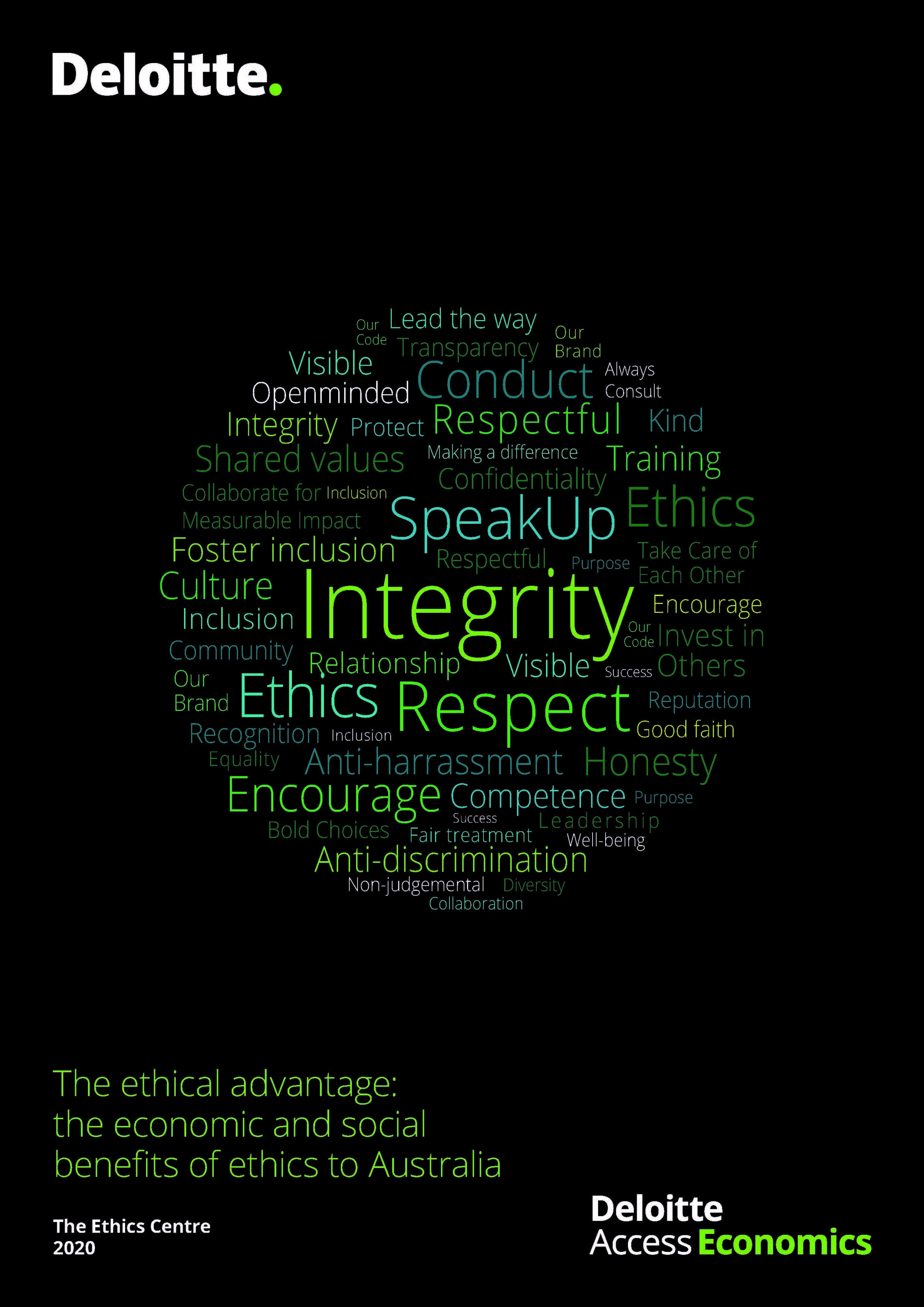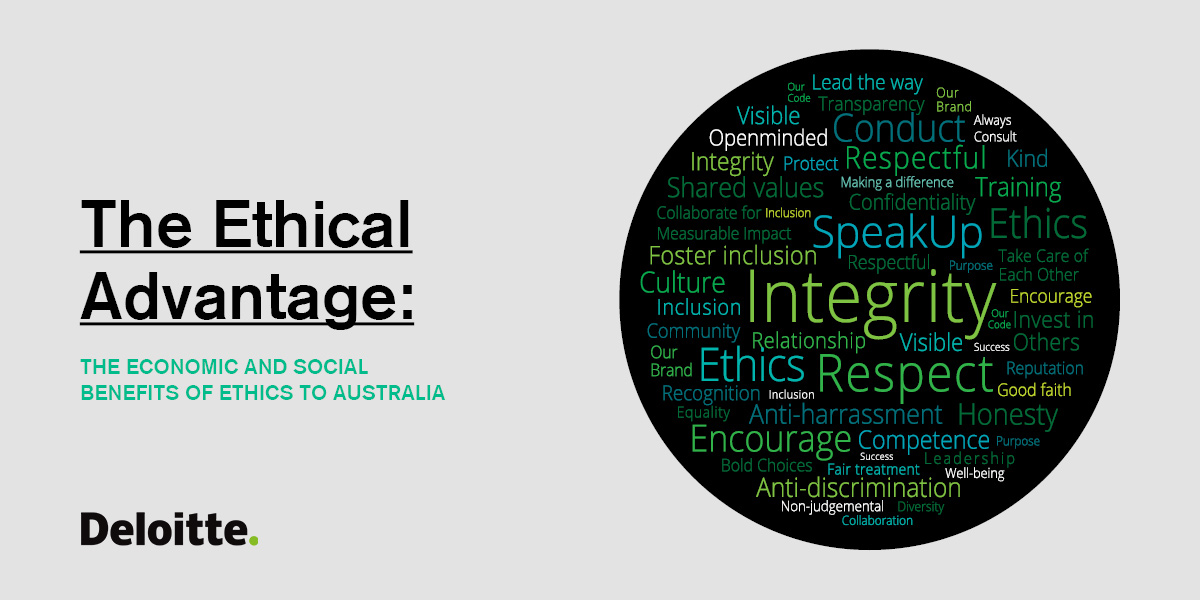The ethical advantage: the economic and social benefits of ethics to Australia
We know what ethical failure costs – look at the billions of dollars paid by financial institutions in penalties and customer remediation since Hayne. But what are the economic benefits of ethical best practice? What can we gain economically by being more ethical as a nation?
Turning around the loss of trust in government, corporations and institutions could deliver Australians significant economic and social dividends. The Ethical Advantage’s exclusive new economic modelling by Deloitte Access Economics shows that if our leaders, businesses, institutions and everyday Australians made more ethical decisions, our GDP, wages, corporate returns and mental health would improve.
For the first time, the report quantifies the benefits of ethics for individuals and for the nation. An increase in ethical behaviour could raise Australians’ average income by $1,800 a year, lifting GDP by $45 billion. An increase in a company’s performance based on ethical perceptions can increase return on assets by about 7%. The modelling also reveals a host of individual and collective benefits for Australians across wages, trust and mental health.
The report also identifies five interlinked areas for improvement for Australia and its approach to ethics, supported by 30 individual initiatives. Download a copy to learn more.
ECONOMIC ADVANTAGE
$45,000,000,000
Lifting Australia's trust levels to that of global leaders would increase the GDP by $45 Billion
BUSINESS ADVANTAGE
7%
Improving a businesses ethical reputation can lead to a 7% increase in return on assets (ROA)
INDIVIDUAL ADVANTAGE
2.7%
A 10% increase in ethical behaviour is associated with a 2.7% increase in individual wages ($23 bil accumulative)
“It is only right to examine how ethical-decision making benefits society. It is not surprising that some of the benefits are demonstrable in economic terms. As a result, purposeful investment to build ethical infrastructure makes sense for our societies and our economies. As we strive to prosper within planetary boundaries and achieve truly inclusive societies, there is urgency to build trust and the capacity navigate these complex challenges. The practical initiatives proposed in this report provide a blueprint for building the ethical infrastructure we need. The recommendations are farsighted in their aims, and their systematic pursuit cannot start soon enough.”
NATHAN FABIAN
Chief Responsible Investment Officer, Principles for Responsible Investment and Chair, European Platform for Sustainable Finance.
“This is a fascinating report showing the value – in every sense of the word – of embedding more ethical reasoning in daily life. I don't think I have ever seen quite such a broad, evidence-based, and wise account of the state of ethics in a society. Perhaps its most important message is that ethics, and ethical reflection, should just be part of everyday decision-making, rather than something to be contracted out to specialists, or worried about only when things have gone badly wrong. Here is an impressive call for a bit more thoughtful examination in every aspect of our public as well as our private lives.”
SIR GEOFFREY MULGAN
CBE, Professor of Collective Intelligence, Public Policy and Social Innovation, University College London
“While there is constant criticism that the school curriculum is overcrowded, this report presents robust arguments why skilling young people around ethical decision-making is to equip them with a capability that not only benefits society and communities, but their own future resilience and wellbeing. If we want to develop independent, life-long learners through our education system – engaged citizens who can operate effectively in a complex, fast-changing and dynamic society – a capacity to think ethically must be a compelling foundation. The Greeks knew it. This new report explains why we may need to rediscover it.”
MARK SCOTT
Secretary, NSW Department of Education
“As our society goes through a time of profound change, both locally and globally, it is timely to reflect on the importance of ethics. This study makes a powerful economic case for investing in the development or improvement of ethics in our society. The real challenge is how we improve our ethical behaviour, both individually and as a society. Directors, as leaders of their organisation, have a key role to play. The days when boards ‘commanded respect’ are over. Directors must approach their task of governance with humility seeking to earn the respect and trust of all their stakeholders. Learning how to deploy an ethical framework to guide decision making is key to ensuring decisions are made in the best interests of the organisation after due consideration is given to the interests of relevant stakeholders.”
JOHN ATKIN
Chair, Australian Institute of Company Directors
“The continuing discussion of the role of ethics and ethical decision making in all our institutions is so important in uncertain times. Most Australians are still not sure we trust our institutions and younger Australians are more cynical about the underlying frameworks used to make decisions and trade-offs. This dissonance is not healthy and needs to be part of our path forward from COVID crisis management and a multitude of royal commission findings into trust, ethical decision-making and choices made. We need to find a way to be our best selves, every day. We need ways of continuing visibility of the measures of ethical standards and to be held accountable for improvement across all industries and sectors in Australia.”
ANN SHERRY
Chair, Unicef Australia
“On the back of numerous royal commissions and recent corporate events, this timely and important report holds a mirror to those of us in the director community, challenging us to understand what we expect of our leadership in governance and whether we have met stakeholder ethical considerations. Do the existing power structures and leadership models reinforce inertia because they benefit ourselves and the status quo at the expense of ethical outcomes? If we do not address these issues, the increasing cynicism around our governance will render us ineffective over time. Are we worthy of the community's trust?”
MING LONG AM
Chair, AMP Capital Funds Management; Deputy Chair, Diversity Council of Australia
“Of all the things that keep a society together, none is more important than a shared sense of ethics. Without it there can be no trust or shared sense of purpose and so no prospect of facing the challenges or realising the opportunities ahead. This report both explains why ethics matter and what we can do to strengthen their central role in our society and economy. Its work on the economic benefits of ethical behaviour is ground-breaking. We should not need an economic rationale for ethical behaviour but by quantifying the economic benefits, this report adds a compelling strand to advocacy on why ethics are foundational.”
PETER VARGHESE
Chancellor, The University of Queensland
“This is a major reform initiative which opens the gates for deep cultural and social change based on a foundation of substantial economic benefit. Australia would be wise to embrace these principled imperatives.”
STEPHEN LOOSLEY
Senior Fellow, Australian Strategic Policy Institute

AUTHORS
Authors

John O'Mahony
John O’Mahony is a Partner at Deloitte Access Economics in Sydney and lead author of The Ethical Advantage report. John’s econometric research has been widely published and he has served as a Senior Economic Adviser for two Prime Ministers of Australia.

Ben?
John O’Mahony is a Partner at Deloitte Access Economics in Sydney and lead author of The Ethical Advantage report. John’s econometric research has been widely published and he has served as a Senior Economic Adviser for two Prime Ministers of Australia.
